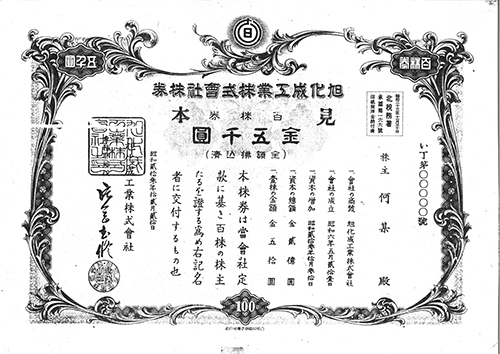100 Stories1949 Listing on the Stock Exchange to Support Corporate Activities, and Market Transitions
Asahi Kasei was born soon after the war. During this period, which was also greatly affected by wartime conditions, stocks played an important role in supporting corporate activities.
Nitchitsu Chemical Industry, the predecessor of Asahi Kasei, was designated as a munitions company on January 17, 1944, two days after the death of Shitagau Noguchi, the founder of Asahi Kasei. Once designated as a munitions company, Nobeoka was also subjected to air raids, and most of the city of Nobeoka was destroyed by fire in 1945. The Bemberg™ and rayon factories escaped a direct hit, but many factories were severely damaged.
Six months later, Nitchitsu was also designated as a target company for Zaibatsu financial dissolution because of its extremely large share of the chemical industry. Nitchitsu decided to convert to a peaceful industry and became a company focusing on Rayon, fertilizers, and industrial explosives. In 1946, the company restarted as Asahi Chemical Industry, taking the character "Asahi" from Asahi Bemberg Fiber, and the shares of Asahi Kasei, which now number over 1.3 billion, were also born.
Issuance of shares is one of the ways for a company to raise funds. The benefits of going public included diversification of financing methods and fund-raising capabilities, as well as increased brand recognition and creditworthiness.
When the stock exchanges reopened in 1949, Asahi Kasei's shares were listed on the first sections of the Tokyo, Osaka, and Nagoya stock exchanges. From the late 1960s, Asahi Kasei began issuing foreign currency convertible bonds, listing its shares on the Luxembourg Stock Exchange in 1969 and on the Frankfurt Stock Exchange in West Germany in 1973, as it expanded its business overseas.
In 1984, the company was selected as a designated stock on seven domestic stock exchanges. In the secondary market, stocks that are rich in marketability and sensitive to market trends are selected as designated stocks to represent their industries. In addition to Asahi Kasei, the list of designated stocks includes eminent companies such as Toyota Motor Corporation, Mitsui & Co. and Matsushita Electric Industrial Co.
However, in 1991, this designated issue system was abolished in order to extend the favorable trading conditions that had been applied only to special issues to general issues. In 1993, Asahi Kasei's stock exchange listing post industry classification was changed from textile to chemical. Kagayaki Miyazaki had previously said, "Asahi Kasei's business type cannot be summed up simply by the word ‘chemicals.’ Is there a post called "living integration?" This is Miyazaki's idea of "Potato vine management," in which various businesses that seem to be in different industries are developed, but are all related to each other at their core.
In recent years, the Osaka Securities Exchange was merged with the Tokyo Stock Exchange in 2013, and the company was delisted from the Nagoya, Fukuoka, and Sapporo Stock Exchanges, and listed only on the Tokyo Stock Exchange. In 2017, the company changed its share trading unit from 1,000 to 100 shares. There are eight different share units, ranging from 1 to 2,000 shares, and these units are determined by each company, with Asahi Kasei changing from the original 1,000 shares.
In 2022, a series of new systems will be launched to support the achievement of the Sustainable Development Goals (SDGs). From April 2022, Asahi Kasei will be listed on the Prime Market*, which was created by Tokyo Stock Exchange's listing classification. The company will enhance its presence as a company that focuses on constructive dialogue with global investors.
*Prime Market The market with the strictest standards among the three market segments that were newly established. A global company that is a target for investment by foreign institutional investors, etc., and is required to disclose information equivalent to the recommendations of the Task Force on Climate-related Financial Disclosures (TCFD).
 Stock certificate (sample), 1948.
Stock certificate (sample), 1948.

